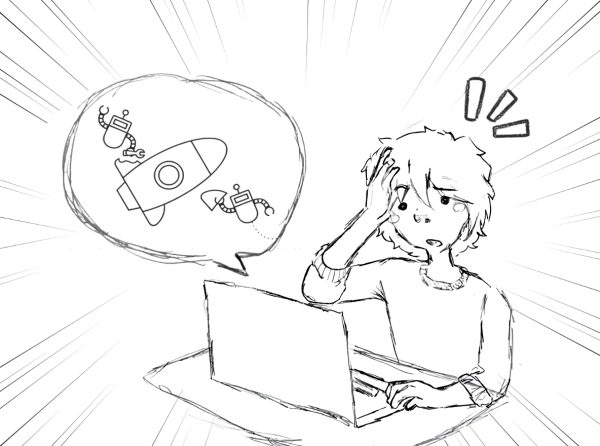Sinners and saints
Criminalizing abortions will not lead people to the Word of God
May 19, 2022

A recent Politico article, which was leaked on Monday, May 2, addressed the inevitable event of the U.S. Supreme Court overturning the momentous Roe v. Wade case; a case in which the right to accessible reproductive healthcare and medical privacy, including yet not limited to abortion, was made a federal right.
Dismantling this legal precedent of choice on the basis of a Christian pro-life doctrine is inherently hypocritical in that there cannot exist a separation of so-called “sinners and saints” if an individual’s innate right to choose is not honored.
The Christian pro-life community holds a common belief that if a person follow the laws and teachings of God, they will be rewarded with the grace and prosperity of heaven. This understanding is conceptually dependent upon the right for an individual to make their own voluntary choices. Without absolute free will, there is no foundation for the dichotomy of sinners and saints to stand upon.
I feel I must preface that I, as a follower of Christ and his teachings, do not in any way regard the act of abortion as an inherent sin, but for the purpose of this argument it will be regarded as such.
If within the Christian dogma, abortion is regarded as a moral sin, then the right to choose whether or not to have one needs to be legalized. In criminalizing the right to abortion, the public is then forced to adhere to Christian saint-like life; therefore, how can the Christian majority discern from the sinners and the saints if there is only one option, thus rendering the alleged holy act of abstaining from an abortion disingenuous? If the goal is to lead more people to the light of God, then there needs to be a voluntary choice to follow.
If we want to truly understand the incongruity between the Christian dogma and the Christian pro-life push for criminalizing abortion, we must understand the ways in which choice is presented within the Bible.
There are many passages where following the Holy Spirit and the Word of God is regarded as a choice one is called to make, yet never forced, legally or otherwise. In other words, one cannot force another to accept God as their savior by simply banning a medical procedure which they deem unholy and sinful. There needs to be a want and a selfless desire to follow God in order for the choice to be within His image.
Take for example when Joshua proclaimed to the Isaelite tribes: “But if serving the Lord seems undesirable to you, then choose for yourselves this day whom you will serve…” (Joshua 24:15)
Within this passage, one can clearly see that choice is advocated for. The voluntary decision to worship God is left to the individual, with the knowledge of subsequent consequences of not choosing that path, according to Christian dogma.
This is the cornerstone of faith; the confidence that the choices one makes is on the path of righteousness. If these choices are legally made obsolete, then doesn’t that contradict the teachings that choosing to follow the Lord must be an act of the mind and soul?
Additionally, there is extreme hypocrisy in the idea that those in power have the right to dictate what others do with their bodies in a controlled and safe manner under the guise of religious morals. It is understood that only God, The Almighty, has the right to judge others, especially on moral grounds. Therefore, the fact that many believe it is within their God-given right to limit autonomy for others is a dangerous path to self-idolization, a sin which the Bible condemns in Exodus 20:4-7.
There exists an air of superiority in that pro-life Christians who argue on the grounds of religious morals regard their sins at a lower standard than those who choose to have an abortion. In other words, the sinful act of placing judgment, not to mention legal oppressive judgment upon others, has a lesser if not obsolete weight in comparison to an individual’s choice to abort.
Within Christian moral belief, God is determined to be the only entity given the power to truly judge others. When individuals begin to place judgment onto others, they are effectively impeding on that individual’s God-given right to free will and voluntary choice.
There cannot exist true faith and trust in God if there is legal pressure to follow one group’s interpretation of the will of God.



























































































Christine Privitera • May 20, 2022 at 9:06 pm
As a mother and grandmother I applaud you Isabella. Your perspective is truly spot on and perfectly presented in a spiritual and factual manner.
Angela • May 25, 2022 at 11:16 pm
What overturning Roe v Wade will do though is lead those women who end up pregnant by their own knowing sinful behavior, to rock bottom. God Almighty is real good at meeting people there, and lifting them back up, with forgiveness. Motherhood (and fatherhood) is a holy calling. Not all are destined to be parents. Some are to be biological parents only. And others are to be adoptive parents. Unfortunately, the entire Christian adoption field is riddled with Psychology instead of screening for Christian features when the agency is supposedly Christian. It’s ruined many a good Church too. At some point abortion is the worst kind of human sacrifice. Christians should not need anyone to tell them that it is just sick and plain wrong. If you don’t want to do the time, don’t mess around. Rape and incest are two different subjects. For another day. Courage is needed. Stop keeping quiet when the whole table is talking about this subject. Be willing to lose a few friends to save an infants life! Call it what it is. Call it what God said it is. One person with the Almighty on their side has the majority. Remember that.
Katie • May 19, 2022 at 4:33 pm
Hi! Thanks for writing. Question: Do you believe this argument should apply to other actions that are both immoral and illegal (under current US and Old Testament law), like murder or theft?